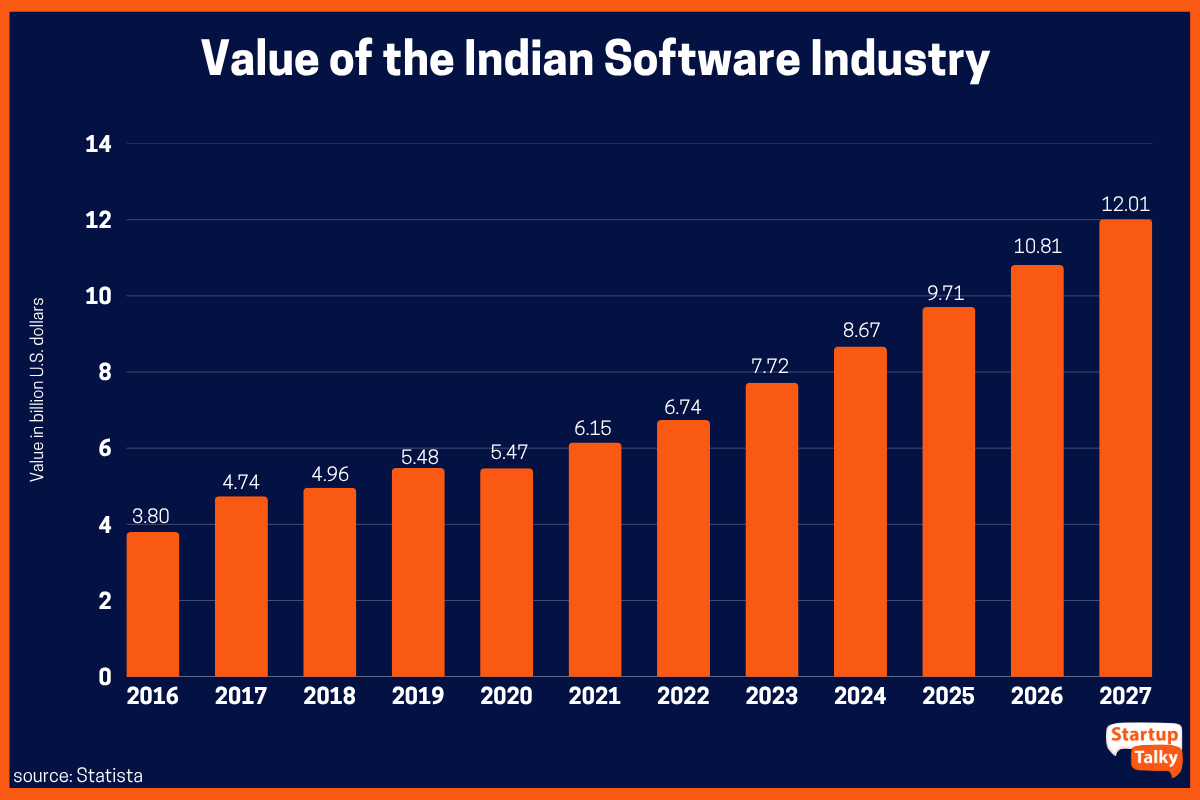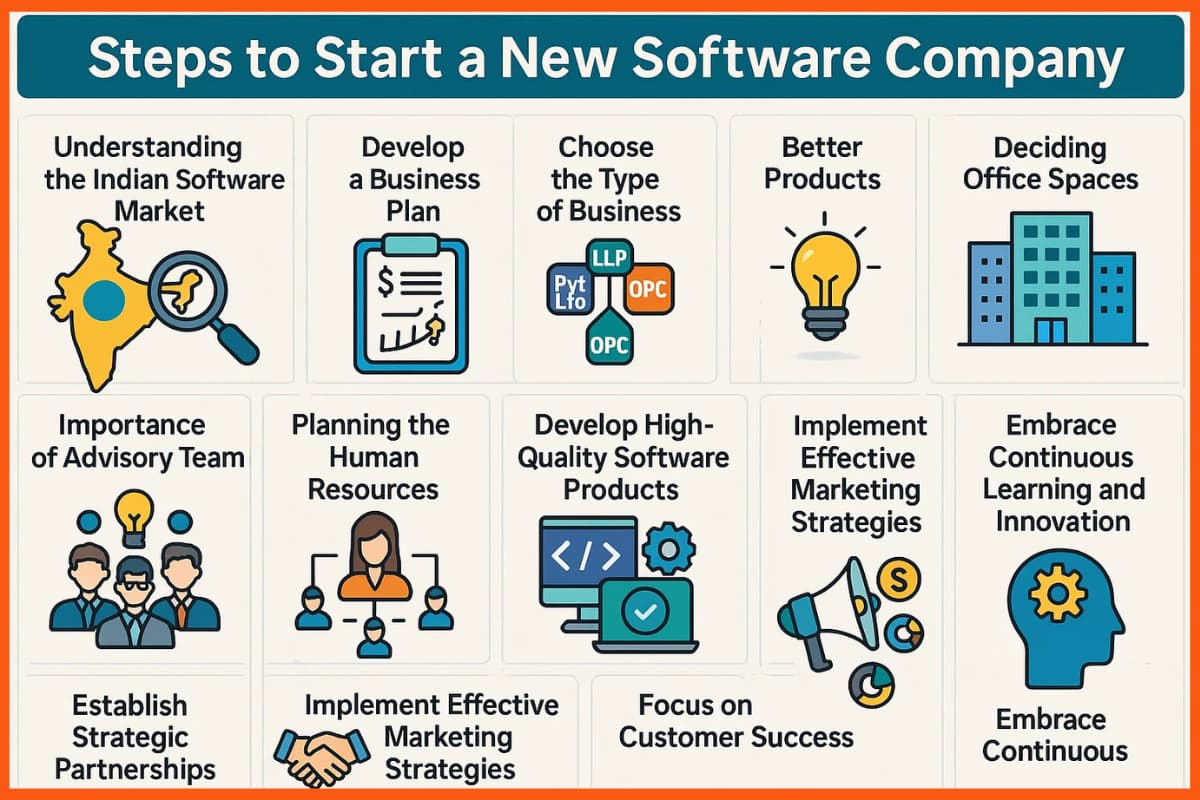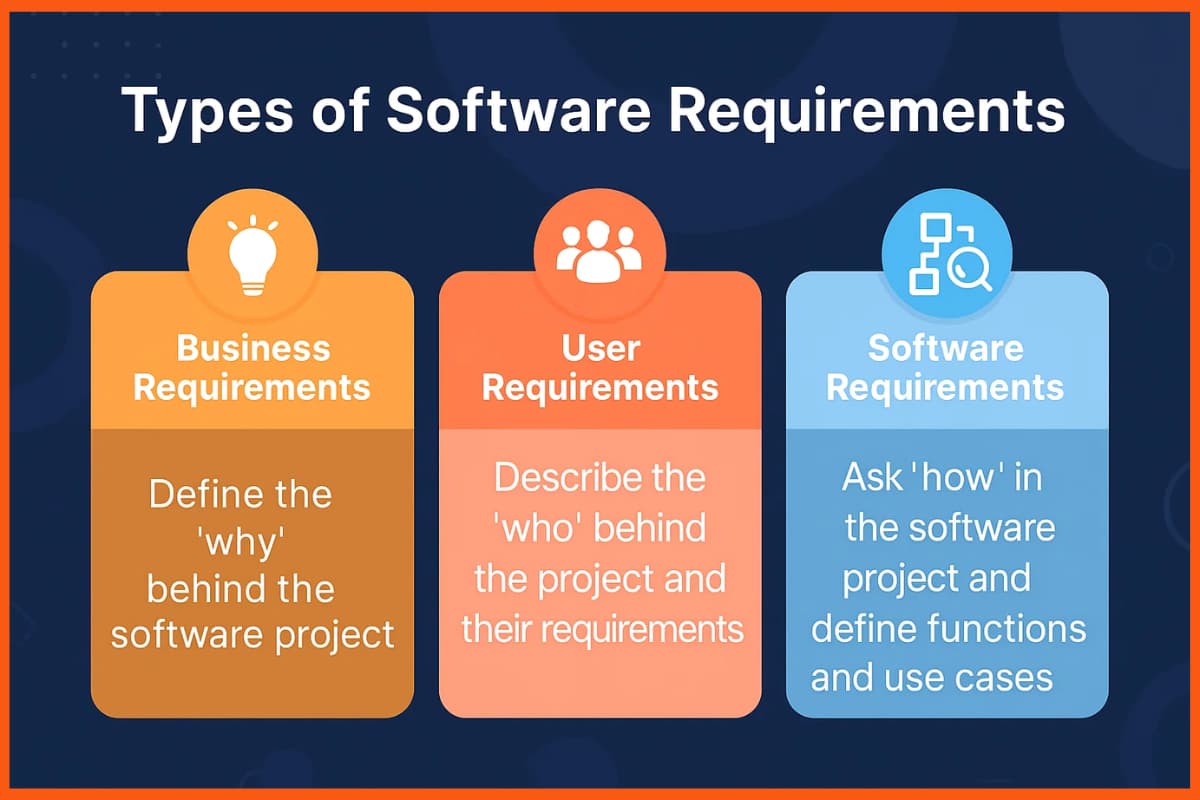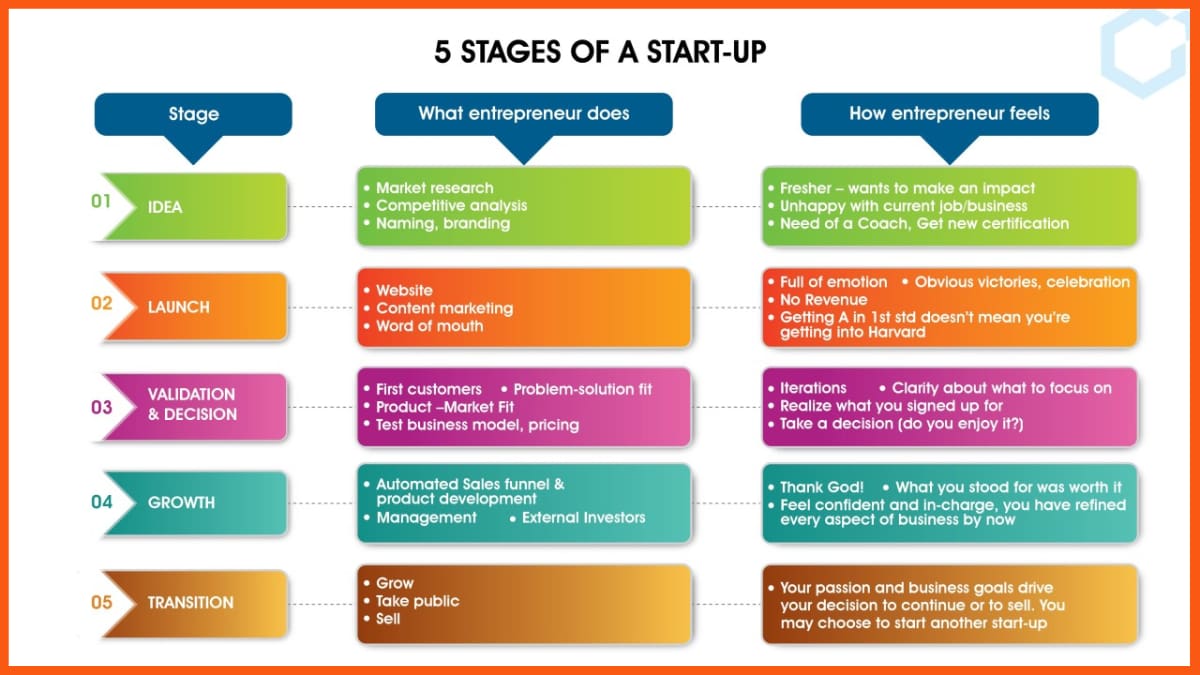India has witnessed remarkable growth in the software industry over the past decade, sparking what many call a software business revolution. Today, India proudly holds the position of the third-largest software startup ecosystem in the world, making it a highly attractive destination for launching IT companies. With technology becoming an integral part of every business, starting an IT firm in India can be a highly profitable venture.
The country is home to several leading software giants like Infosys, Wipro, Tech Mahindra, and TCS, which provide end-to-end software solutions to global clients. These companies have a strong presence in major Indian cities, playing a key role in shaping the nation’s software development ecosystem. Additionally, global corporations such as Capgemini, L&T, Tata, and Mphasis have firmly established their operations in India and continue to grow, further strengthening the country’s reputation as a global software hub.
In this blog, we will guide you through the essential steps and strategies to kickstart and expand your software company in India. From market research and legal considerations to team building and scaling strategies, we’ve got you covered. So, let’s dive in and explore the exciting journey of establishing a thriving software venture in India.
Importance and Potential of Starting an IT Company in India
Growth of Software Industry in India
Types of Software Companies
Raise Funds for Software Companies
Steps to Start a New Software Company
Legal Entities for a Software Company In India
Identifying Potential Challenges and Risks in the Software Industry
Importance and Potential of Starting an IT Company in India
Starting an IT company in India holds significant importance and offers immense potential for growth and success. Here are some key points highlighting the importance and potential of venturing into the software industry in India:
- Thriving software industry with domestic and international demand.
- An abundance of highly skilled and talented software professionals.
- Cost-effective solutions compared to other countries.
- Technological expertise in emerging fields like AI, ML, and cloud computing.
- A growing domestic market with increasing digitization.
- Supportive ecosystem for startups and IT companies.
With the right strategies, innovation, and a customer-centric approach, software companies in India can achieve significant success and contribute to the country’s digital transformation.

Growth of Software Industry in India

The Indian software industry is growing fast. A new report says the market could reach $100 billion by 2025. It may grow five times bigger and hit another $100 billion by 2035, starting from $20 billion in 2025. This growth is happening because more people in India are using software, digital tools are becoming more common, and there is strong demand for Indian software from around the world.
The Indian software market is expected to grow to $10.66 billion by 2025, with most of the money coming from enterprise software (used by businesses). The total revenue of the Indian IT sector is likely to reach $245 billion in the financial year 2023, and out of that, $224 billion is expected to come from exports.
Types of Software Companies
The Software Companies in India can be categorized into types in how they function. To start a company, the right category needs to be chosen. There are mainly two types of software companies
1. Product-Based Software Company
The Product-based Software Company deals with end products and sells them to targeted customers. These types of IT Companies have products or a set of them that provide a major portion of the company’s revenue. Some best Software Product-based or development-based Software Companies in India are Amazon, Microsoft, Cisco, Google, Tally, and many more.
2. Service-Based Software Company
The Service-based Software Company deals with services that are to be performed and sells them to the targeted audience. The Services provided are Business Consulting, IT, Hardware, and Software Engineering, and outsourcing Services to clients.
The top Software Consulting or Service Companies in India are Wipro, Infosys, Accenture, Tech Mahindra, Oracle, and many more. These companies provide a wide array of services, including application development, ERP solutions, programming, quality assurance and testing, custom business solutions, database migration, collaborative commerce, and multimedia offerings. Their expertise and capabilities make them valuable partners for businesses seeking software solutions tailored to their specific needs. With their extensive service portfolios, these companies continue to drive innovation and deliver exceptional value to clients in the Indian software market.

Raise Funds for Software Companies

Traditional Businesses depend on Bank Loans and other means, like asking for investment from friends, family members, but it is somewhat different from online businesses. In this industry, there are a lot of angel investors for the Software development of Software Companies. There are numerous financial ways the entrepreneurs adopt to collect funds from various means, and it is not as difficult as it seems.
Steps to Start a New Software Company

Starting a software company requires careful planning and strategic steps. Here are the key steps to follow:
1. Understanding the Indian Software Market
Before venturing into the software industry, it’s crucial to gain a thorough understanding of the Indian market. Research the current trends, demand, and competition in the software sector. Identify target customers, their needs, and pain points. This knowledge will help you shape your company’s value proposition and differentiate yourself in the market.
By understanding the Indian software market, you can identify the right opportunities, position your company effectively, and develop software solutions that resonate with the needs of Indian customers. This knowledge will be instrumental in formulating successful strategies and driving the growth of your software company in India.
2. Develop a Business Plan
Create a comprehensive business plan that outlines your company’s vision, mission, goals, target market, product/service offerings, and marketing strategies. Define your unique selling proposition (USP) and identify your competitive advantage. A well-defined business plan will serve as a roadmap for your IT company’s growth and success.
3. Choose the Type of Business

Consider the factors like choosing the appropriate type of products and services, targeting the specific audience or market, profitability, and feasibility of the business. Software company entrepreneurs have to consider several situations before making a choice. Entrepreneurs should pay attention to targeting a niche market as the competition increases.
It is also required to focus on making use of new channels for distribution that effectively provide solutions. Software entrepreneurs are also supposed to give better economic solutions, making customers interested in buying their products and services.
4. Better Products
Entrepreneurs have to think and come up with a better version of their products, which is also called an update to the existing plan. Once a full-fledged and integrated product is developed and set out in the market, it should be protected through copyright and trademark.
Entrepreneurs also start marketing on a digital platform, as the software is mostly among the young crowd, it has to be noticed by them and create a space to promote the product. It can be started by creating a website and then providing a demo of the updated software. Suitable Platforms like Facebook, Twitter, and YouTube should be used for promotion, providing information on the new updates, and getting feedback from the viewers.

5. Legal Considerations
Register your software company as per the legal requirements in India. Choose an appropriate legal structure such as a sole proprietorship, partnership, limited liability company (LLC), or private limited company. Obtain necessary licenses and permits.
Licenses are meant to allow businesses to carry out the procedure without any legal interruptions. The STPI Licenses are exclusively for new software companies starting in India and provide them with several facilities and benefits, like no tax payment for 5 years or no import or export duty for software products. The license holders can also enjoy the facilities, like availing offices at lower than usual rates.
Consult with legal experts to ensure compliance with intellectual property laws, data protection regulations, and other legal obligations.
6. Deciding Office Spaces
When there is a plan for starting a software company, the entrepreneurs should also plan for ideal office spaces or working spaces. A location that has the most appropriate infrastructural facilities, such as a consistent internet connection and easy availability of resources, should be chosen.
The business owners should aim to make the minimum possible investment in securing the office spaces. There are options like renting or leasing office space. The necessary equipment, like computers and furniture, can also be purchased second-hand to easily start the operations.
7. Importance of Advisory Team
In the quest to find like-minded people who are willing to participate in the business. Business owners should find a similar level of enthusiasm, in addition to knowledge.
The collaborations are also helpful in providing distribution and marketing channels for the products and offering integrated solutions. The advisory team should comprise tech-savvy people, marketing professionals, and the design team, along with experienced industry professionals who can provide ideal advice.
Focus on creating a positive work culture that fosters creativity, collaboration, and continuous learning.
8. Planning the Human Resources
When the company is started and running, entrepreneurs should focus on recruiting a talented HR team. India is a place where there are plenty of well-trained professionals, especially in the software technology sector.
9. Develop High-Quality Software Products
Invest in developing high-quality software products that address market needs and provide unique value to customers. Emphasize user experience, scalability, and security in your software solutions. Keep up with technological advancements and ensure your products are up-to-date with the latest industry standards.
10. Establish Strategic Partnerships
Collaborate with other software companies, technology providers, and industry leaders to expand your network and access new opportunities. Partnering with established brands can help you gain credibility, reach a wider customer base, and enhance your product offerings.
11. Implement Effective Marketing Strategies
Develop a robust marketing strategy to promote your software company and reach potential customers. Utilize digital marketing techniques such as search engine optimization (SEO), content marketing, social media marketing, and paid advertising. Engage in thought leadership by publishing valuable content, participating in industry events, and building a strong online presence.
12. Focus on Customer Success
Prioritize customer satisfaction and build strong relationships with your clients. Provide exceptional customer support, listen to their feedback, and continuously improve your products and services based on their needs. Happy customers become brand advocates and contribute to the growth of your software company through positive word-of-mouth referrals.
13. Embrace Continuous Learning and Innovation
Software companies in India must embrace continuous learning and innovation. This is an ever-evolving industry, and staying ahead requires a mindset of constant improvement and adaptation. By embracing continuous learning and innovation, software companies can adapt to the changing landscape, deliver cutting-edge solutions, and maintain a competitive edge in the Indian market. Remember, the key to success lies in being proactive, agile, and willing to embrace new ideas and technologies.

Legal Entities for a Software Company In India
Before starting a Software Business in India, entrepreneurs need a legal entity for Business. There is a popular legal entity that is enabled to start a Business in India.
- Sole Proprietorship: Probably the best legal entity to try and start new ideas in starting with a nominal cost. It won’t be a company, but owners can say a Sole Proprietorship firm.
- Partnership Firm: It is a good opportunity for businesses when the business owner has Co-Founders and tries collectively to work out the business idea with a minimum legal cost.
- Private Limited Company: A Real Company for Businesses in India. Almost more than 90% of business owners register their Companies in India as a Private Limited Company.
Identifying Potential Challenges and Risks in the Software Industry
Identifying potential challenges and risks in the software industry is crucial for software companies to navigate successfully. Some key challenges and risks include:
- Rapidly evolving technology
- Intense competition
- Talent acquisition and retention
- Security threats and data breaches
- Changing customer demands
- Regulatory and legal compliance
- Economic and market fluctuations
By identifying and proactively addressing these challenges and risks, software companies can enhance their resilience, competitive edge, and long-term success in the dynamic software industry.
Conclusion
Starting and growing an IT company in India offers immense opportunities and potential in today’s digital age. The thriving software industry, coupled with the abundance of skilled professionals and a supportive ecosystem, makes India an ideal destination for software entrepreneurs. By following the key steps outlined in this blog, such as understanding the market, embracing innovation, building a strong team, and leveraging government initiatives, aspiring software company owners can navigate the path to success. With dedication, continuous learning, and a customer-centric approach, entrepreneurs can establish and expand their IT companies, tapping into the vast potential of the Indian market and making a significant impact in the tech industry.
FAQs
How to start software company in India?
The following are the steps to start IT services company in India:
- Understanding the Indian Software Market
- Develop a Business Plan
- Choose the Type of Business
- Better Products
- Legal Considerations
- Deciding Office Spaces
- Importance of Advisory Team
- Planning the Human Resources
- Develop High-Quality Software Products
- Establish Strategic Partnerships
- Implement Effective Marketing Strategies
- Focus on Customer Success
- Embrace Continuous Learning and Innovation
Which city has more software companies in India?
Bangalore is the IT Capital of India and a global information technology hub in the country. The city is known as the Silicon Valley of India, with a large number of software companies in India, and many top Indian firms like Infosys, Wipro, and Mindtree are headquartered in Bangalore.
How can I start my own software company in India?
Four major steps to register a company/ startup in India:
Step 1: Acquire Digital Signature Certificate (DSC)
Step 2: Acquire Director Identification Number (DIN)
Step 3: Create an account on the MCA portal- New user registration @ mca.gov.in.
Step 4: Incorporate or Apply for the company to be registered.
Do software companies make money?
The software vendor gets recurring income and an opportunity to increase the subscription fees annually and upsell premium packages. The recurring revenue helps SaaS vendors achieve the break-even point faster than Licensed Software vendors and earn higher profit in the long-term.
How to get clients for a software company?
Getting clients for your software company is challenging. These are some ways to get potential clients-
- Referrals previous clients. Getting referrals from previous clients is by far the best source of getting new clients.
- Social media.
- Directories & marketplaces.
- Your company website.
- Outbound sales.
- Network.
- Events & trade fairs.
- Partnerships & resellers.
How do companies make money from free software?
Most free web services plan to make money by the following: Freemium model – sell a free product and plan to convert some of them to a paid plan. Majority of SaaS products use this model. Limited period promotion – Start with the free product for a promotional initial period and plan to charge it later.
Which are the top software companies in India?
Top software companies in India are:
- TCS
- Infosys
- Wipro
- HCL Technologies
- Tech Mahindra
- Larsen & Toubro Infotech Ltd.
- Mindtree Ltd.
- Capgemini India Pvt ltd.
- Mphasis
- Accenture
What legal requirements are necessary to start a software company in India?
To start a software company in India, you need to register your business as a legal entity, obtain necessary licenses such as STPI (Software Technology Parks of India) License, and comply with tax and regulatory obligations.
How can I find skilled professionals for my software company?
India has a vast pool of talented software professionals. You can leverage online job portals, professional networks, and recruitment agencies to find suitable candidates. Participating in industry events and building relationships with universities can also help you connect with fresh talent.
What is IT company startup cost in India?
Starting an IT company in India can cost anywhere between INR 1 lakh to INR 10 lakhs or more, depending on the size and services offered. Basic costs include company registration, legal fees, office rent, equipment, and salaries. If you’re starting small with a few team members and offering software or web development, you can begin with lower investment.

















































